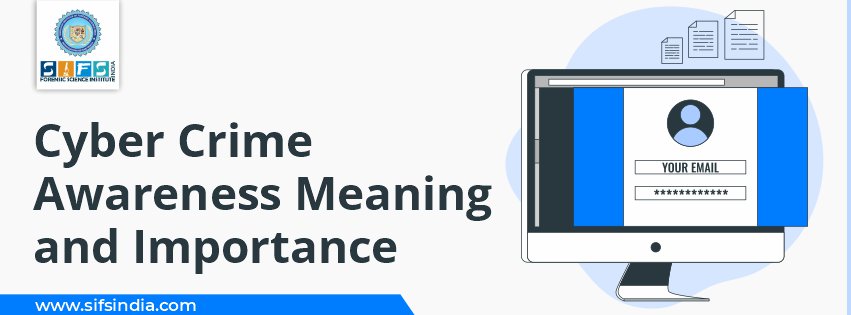- Call Us: +91 7303913002
- Email Us: education@sifs.in
Cyber Crime Awareness | Meaning and Importance

BY SIFS India | January 07, 2022
Cyber Crime Awareness | Meaning and Importance
The usage of information technology is increasing at a rapid rate. It has made for everyone to easily access the internet, increasing the number of internet users.
Also, technology is not constant, and it is continuously evolving. It makes it very difficult for end-users to be aware of measures to protect their data privacy.
Individuals, as well as companies, rely on IT systems. But they are not aware of the cyber risks, ways to handle them, and how to protect themselves from such risks.
The primary purpose of a cyber awareness program is to educate people about possible cyber threats and avoid a data breach.
However, no method can guarantee complete security from the attacks but can help reduce their occurrence and equip end-users and professionals with practical knowledge to mitigate such risks.
What is Cyber Security Awareness?
Cybersecurity awareness means knowing about various cyber threats, the ability to detect potential threats, and taking measures to mitigate their effect to protect your digital assets.
Being aware does not mean that you can eradicate cyber-crime or data theft from the root. But it does help in preventing significant losses that end-users or businesses might suffer due to these attacks.
So, cybersecurity awareness programs play a crucial role in educating individuals, students, parents, and enterprises in this internet age about possible cyber-attacks and their prevention methods.
Common Cyber Threats
Phishing
It involves sending fraudulent emails that look to be from a renowned company to the user. It prompts you to click on a link to extract personal information, such as credit card or password details.
Spear Phishing
It involves sending specially written emails to a specific individual or organization. You feel it to be delivered through someone you trust. Malware gets downloaded if you click on a link or open an attachment with the help of which sensitive information can be stolen.
Smishing
In this, you receive fake text messages in the name of reputed companies to shell out sensitive personal information.
Vishing
It is an illegal practice in which you receive voice messages or phone calls on behalf of a reputed company to extract sensitive information, such as credit card or bank details, from you.
Malware
It is software specifically designed to gain unauthorized access and cause harm to computer systems. For example, viruses, spyware, Trojan horses, worms, ransomware, etc.
DNS (Denial-of-service) Attack
It is a kind of cyber-attack where attackers take advantage of DNS (Domain Name System) vulnerabilities and divert your site visitors to malicious sites. It also involves illegitimate domain name creation resembling your original one and using it to steal credentials by running phishing campaigns.
Man-in-the-Middle Attack
In this, the cybercriminals place themselves between the two-party transaction or communication. In the process, they might steal sensitive information and manipulate data also.
What are the Best Practices for Cyber Security Awareness?
There are several methods to spread cyber awareness among end-users and employees to mitigate risks, each having a different impact on the person.
Conducting Training Sessions
Cybersecurity awareness training sessions can be offline, live instructor-led, game-based, or in the form of pre-recorded videos. These sessions equip end-users (especially students and parents) and professionals with the knowledge and the importance of using genuine software and apt gadgets, having strong passwords, and using a two-step verification process.
Practicing Data Recovery Strategy
Always have a backup plan ready to protect your data from getting lost or damaged. As more and more people and businesses opt for cloud storage, it becomes essential to have a fool-proof plan to protect your cloud-based data.
Detecting and Planning
Businesses must educate their employees to detect possible threats and implement security measures to prevent their occurrence or avoid huge losses.
Impact of Cyber Awareness on Learners
Short-term: Information spread in the form of videos, posters, newsletters
Intermediate: Information spread in the form of case studies, lectures, hands-on workshops, and training
Long-term: Information delivered in the form of seminars, group discussion, courses
Final Words
Now is the internet era, and the use of the internet and dependency on digital technologies will increase manifolds in the coming years.
So, being aware of several cyber threats and their prevention is the only solution to safeguard yourself from the malicious activities of hackers.
Every year, cyber security month is celebrated to spread awareness among people about different types of attacks and what methods they can implement to protect themselves from becoming victims of such attacks.
Cyber awareness programs make you aware of different types of threats and what measures you can take to protect yourself from falling prey to such attacks.
SIFS INDIA has conducted several online and offline cyber security awareness courses and programs to date for both individuals and businesses.
To equip people with the proper knowledge, they have many short-term and professional government-recognized practical-oriented cyber-security certificates and diploma programs covering all the essential information to protect you from unethical hacking activities.
